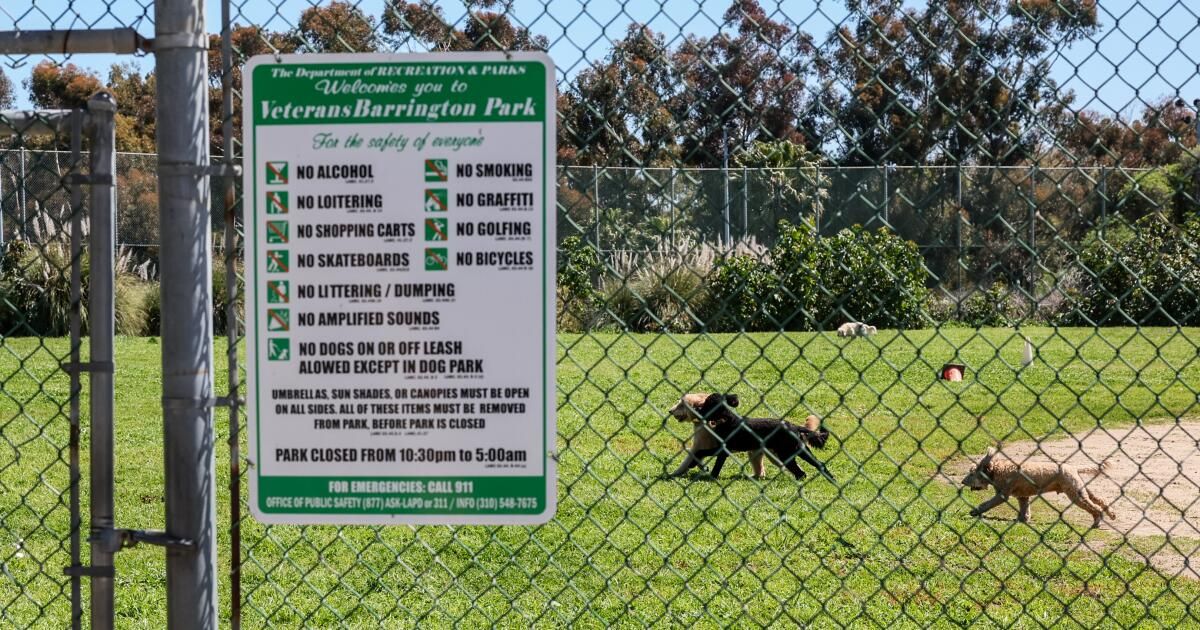To the editor: I appreciate the increased awareness Nadav Ziv brings to the problem of dog owners going almost everywhere with their pets in Los Angeles.
I have worked at a local hospital for 20 years and only in the last three years have I had the experience of people bringing their non-service dogs to clinical visits. We are only allowed to ask two questions: Is the dog a service animal required due to a disability? And what job has the dog been trained to do?
It is not difficult for the owners to avoid these issues. We are not allowed to ask for documentation.
It's pretty obvious when a dog isn't a true service animal. They wander around the clinic room, their vests are often dirty, and their owners don't treat them the way service animal owners do.
Service animals are very important to those who benefit from them, and becoming one requires a rigorous training program. Those who mistakenly call their dogs service animals downplay the importance of these training programs.
As with so many other issues, it all comes down to awareness and treating others the way we would like to be treated.
Linda Marie Randolph, Los Angeles
..
To the editor: While Ziv raises some valid points, the attached image showing dogs running loose in Veterans Barrington Park calls for clarification.
I’m one of the early-morning rule-breakers (and I’m a veteran) who gathers at what we call the “gopher field” with our loose dogs. The Department of Veterans Affairs property is maintained by the Los Angeles Department of Recreation and Parks, and the seven-acre site is riddled with holes that make the field unsafe for youth sports. Except for a few infrequent activities on the lot, the land is fallow and inviting.
There is an adjacent “official” dog park that is typically used by dog walkers at midday. The dog-loving community is friendly and responsible because we respect the unspoken privilege granted to us in a place where a dog can be a dog.
Unfortunately, owning a dog does not automatically confer on the owner an excellent character or education. Therefore, there is a minority of dog owners with an overdeveloped sense of entitlement.
Gary W. Dolgin, Santa Monica
..
To the editor: The question is not, “Why can’t dog owners obey the rules?” The question is, “Why don’t dog owners obey the rules?”
Humans have the ability to obey rules (i.e., they can do it). The problem is that some dog owners choose not to obey them (i.e., they don't want to do it).
I don't have the answer to why some people believe they have a special status that allows them to ignore the rules that were set up to benefit everyone in our society. What I do know is that their selfish sense of entitlement harms our society.
Jo-Ann Shelton, Santa Barbara
..
To the editor: A section of the edge of the Silver Lake Reservoir juts out and becomes what the community calls “the meadow.” For years, community groups worked with the Los Angeles Department of Water and Power to complete the continuous path around the reservoir, and after deliberation, it was decided that it would be best for the public to exclude dogs from the area.
The signs clearly state that dogs are prohibited, and coincidentally, there is a large dog park on the other side of the reservoir. And yet, owners bring their dogs there.
Why can’t dog owners in Los Angeles obey the rules? The answers I get when I ask are, “I live in the neighborhood,” “I keep my dog off the grass and on the road,” and “No one pays attention to the signs.”
No shame, no apologies, just assertions of entitlement.
Dorcas Tokes, Los Angeles












